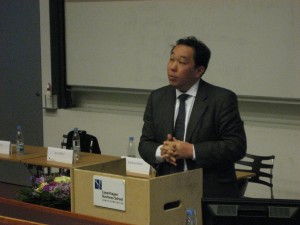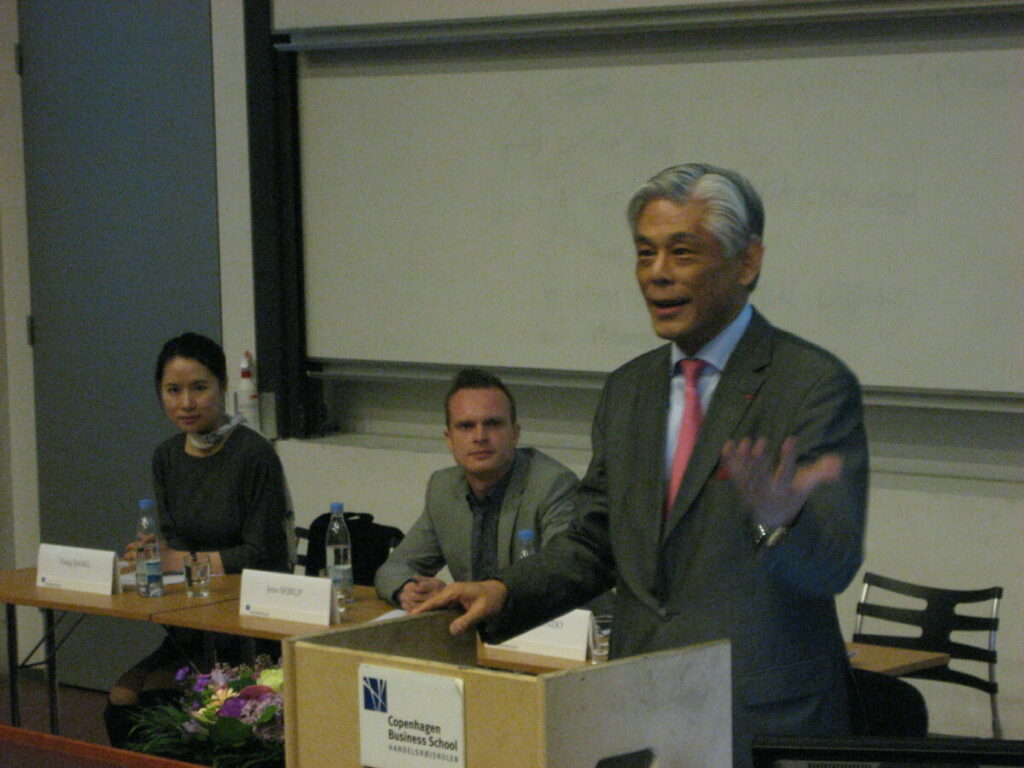I get frequent email updates from the Japanese Embassy here in Copenhagen about events such as film screenings or art exhibitions. This month finally there was an event related international relations – and held at my alma mater, Copenhagen Business School no less. Diplomacy in East Asia: Japan, US and China Relations in the 21st Century.
Key note speaker at the event was professor at Kobe University Dr. Toshihiro Minohara. A further panel consisted of Dr. Yang Jiang (Asia Research Centre at Copenhagen Business School), Mr. Jens Sejrup (University of Copenhagen) and Japanese ambassador to Denmark Seiichi Kondo who has a very impressive CV (pdf).
Whereas the initial speeches by the participants were all very bland and disappointing the ensuing 2 hour debate was extremely enlightening.

The initial speech by professor Minohara in particular was very disappointing. He is American-born and so speaks very forthrightly but content-wise there was nothing that a first year student of Japan couldn’t have come up with given a little effort. He spoke also more like a politician than like an academic. His speech consisted of either descriptive or normative statements: “Japan’s history and economy looks like this and this. Foreign relations are like this. Japan should attempt policy X. Period.” No analysis or very little reasoning. His views are cautiously hawkish conservative (if that is possible) but unlike conservative hawks in Washington he seemed to be based more in reality than populist rhetoric.
His basic points were that Japan should remove article 9 of the Japanese constitution; both hedge and bet on China’s rise; and try to settle the smaller disputes over islets that are still ongoing with both Russia and Korea. At the same time he was clearly aware that widespread and virulent anti-Japanese sentiments in Korea and China means that these things are not something Japan can just decide to do.
His arguments for removing the controversial Art. 9, the so-called Peace Article forever renouncing war as a sovereign right of the Japanese nation went along these lines: Japan should have a constitution written by Japanese; Art. 9 is unique in the world and therefore unrealistic and outdated; it holds Japan back from being a “proper nation” that can act to assist its allies; the reality of Japanese armed forces today has moved beyond the idealism of Article 9; removing it would enable better popular control over Japan’s armed forces, which at the moment exists in a constitutional vacuum and where resentment over a lack of recognition is brewing among officers.

Ambassador Kondo’s initial remarks were very diplomatic to the point of not making a lot of sense apart from : Let’s all be friends.
During the debate, however, he showed real intelligence and even approached something of a rationale for Japan’s focus on soft power in foreign relations. This policy choice is often presented in the most cute and dimwitted way possible with references to the popularity of Japanese fashion and manga. As if Japanese decision makers simply stumbled upon an opportunity (to make money), didn’t have the brain power to think critically about this choice, nobody seemed to object, and so simply went along with it.
Ambassador Kondo, being among other things the former director general of both OECD’s cultural affairs and public diplomacy departments, is possibly in a unique position in the world to have some thoughts on this issue. His point, as I understood it, was that soft power in the form of manga etc. exposes consumers to other world views. His analysis is that narrow-mindedness or the multi-cultural inexperience of populations in surrounding countries is a cause of much of the problems that Japan finds itself in with its neighbors. He said that Japan has a longer and more intense history of interaction with other cultures and so is more used to juggling different world views. Whereas Japan went through the process of acquainting itself with others through war and colonization, manga, anime, etc is an efficient means of achieving the same thing through peaceful means. His hope was that in time this process will result in a toning down of aggression levels towards not only the Japanese. (We could use that kind of effort in the Middle East …)
This may be an over-simplified analysis but I was personally very relieved to finally hear a proper rationale behind this incessant Japan=soft-power-talk that so emanates from official Japanese side.
A heavy burden was on the shoulders of Dr. Yang Jiang. Tasked with representing the Chinese side, her talk was well prepared, eloquent and addressed the issue at point.
Her main goal was to try and counter the idea that China is turning into a bully that needs to be contained by countries such as Japan or the US. She put forward the stated policy goal of Chinese leaders: to become a “responsible great power”. She then gave a number of examples of China listening and interacting with its neighbors peacefully.
My contention is that the word “responsible” remained undefined. She simply quoted Chinese leaders and they have not yet felt it opportune to define it – because China is not yet a “great power”. My suspicion is that “responsible” in this context should properly be understood in terms of how Confucianism sees relationships between those with more and those with less power – men/women, older/younger, ruler/ruled. Confucianism expects those without power to defer to those with power in all matters of life. Those with power has the responsibility to protect and the duty to guide those without power. This is hierarchical system with strict separations between strata.
Chinese leaders do not, I think, at the moment consider China to be a full-fledged “great power”. If they follow a Confucian way of governing, the moment that they feel that they have reached that level we should see an about-turn in attitude towards their neighbors. From existing on the same level they would suddenly feel themselves rightfully above others and therefore entitled to bossing around with those below – in return for a friendly Chinese military presence in their countries of course. China as the benevolent and absolute ruler and not the listening friend that Dr. Yang Jiang portrayed.
Finally, Mr Jens Sejrup was also part of the panel. He gave some poignant and intelligent questions but does not yet have the stature of the other people on stage that day. He is the go-to-guy these days in the media when it comes to Japanese affairs and seems promising in my eyes. We might hope that one day he becomes an actual capacity.